Choice in Treatment Modality Overwhelmingly Important to Cancer Patients & Survivors
Overview
The American Cancer Society Cancer Action Network (ACS CAN) empowers advocates across the country to make their voices heard and influence evidence-based public policy change, as well as legislative and regulatory solutions that will reduce the cancer burden. As part of this effort, ACS CAN deploys surveys to better understand cancer patient and survivor experiences and perspectives, through our Survivor Views research panel. The panel is a group of cancer patients and survivors who respond to regular surveys and provide important insights to support ACS CAN’s advocacy work at all levels of government.
Fielded January 9-February 3, 2025, our latest survey explores patients’ and survivors’ experiences with cancer treatment, and found several advantages associated with oral cancer therapies compared to IV infusions. The web-based survey was conducted among 1,073n cancer patients and survivors nationwide who have been diagnosed with or treated for cancer in the last seven years, including 327n who have received IV infusion treatment and 338n who have received oral anti-cancer drugs.
Key Findings
- Those taking an oral medication are significantly more likely to say the treatment made their life easier than those receiving IV infusion (31% vs. 17%). IV infusion patients are twice as likely to say the treatment made their everyday life more difficult (40%) compared to patients taking an oral treatment (18%).
- IV infusion is also rated as the most difficult treatment when it comes to coping with side effects (41%), compared oral treatment (24%).
- Nearly three-quarters (74%) of patients taking an oral medication report completing visits to their provider within an hour or less, compared to only 17% of those receiving IV infusions
- 82% say cost is an important factor in their decision when given a choice of treatment options, and 94% agree it is important that patients and their doctors are able to choose their best treatment.
Detailed Survey Findings
Oral Cancer Treatments Have Much Less Negative Impact on Everyday Life
Cancer patients and survivors in this survey are more than twice as likely to say that prior to beginning treatment their cancer had little to no impact on their ability to engage in everyday life (62%), as they are to say their cancer significantly disrupted their life (29%). However, 40% of those who received IV infusion report that the treatment made their life more difficult. Just 17% say IV infusion made their life easier, while 43% felt the net impact was neutral. By comparison, only 18% of those who received oral cancer drugs say the treatment made their life more difficult, and 31% say it made their life easier.
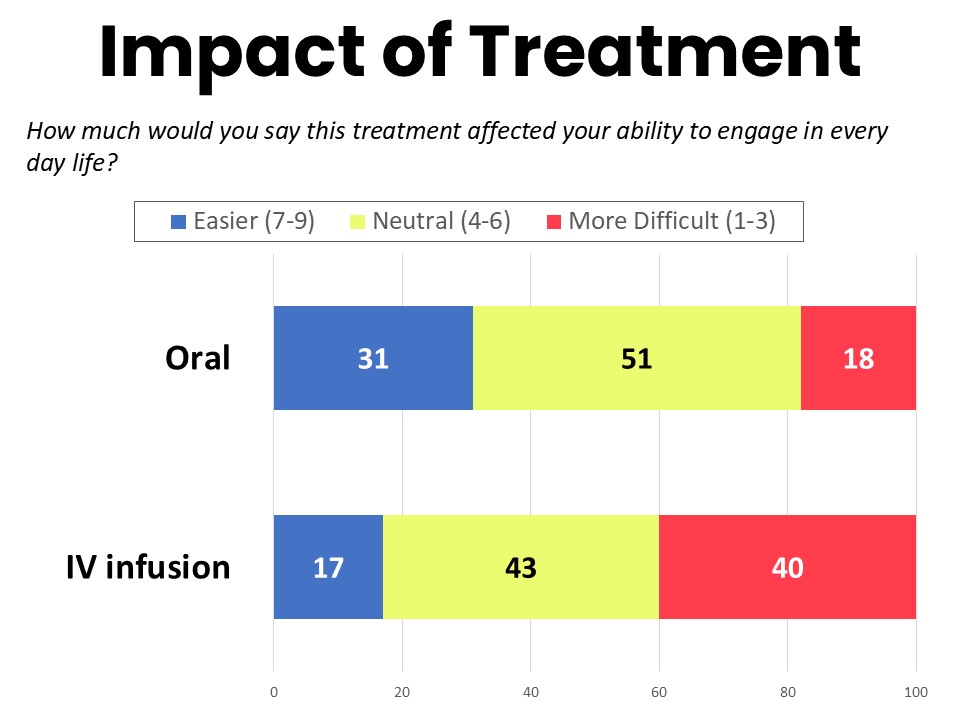
Oral Therapies Offer Easier Side Effects and Less Time with Providers
One reason patients receiving IV infusions are twice as likely as those on oral therapies to report their treatment making their life more difficult may be their more negative experience with side effects. Forty-one percent of those receiving IV infusion rated coping with side effects as difficult (41%), compared to just 24% of those taking oral treatment. Nearly one-third (32%) of those taking oral cancer drugs say it was easy to cope with the side effects.
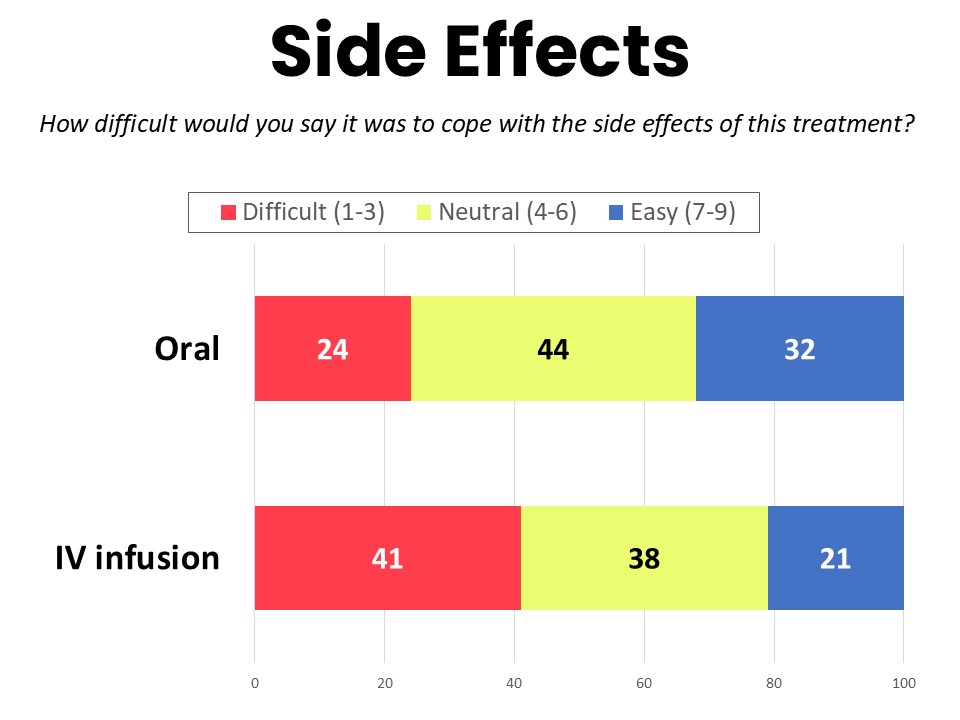
Shorter time spent in providers’ offices may be another reason why those taking oral therapies are more likely to say the treatment made their life easier. Half of those taking oral cancer drugs say their visits were completed in less than an hour, while 74% say the visits took an hour or less. By comparison, only 17% of those receiving IV infusions report completing their appointments in an hour or less. Forty-one percent of IV infusion patients say their visits took four hours or more.
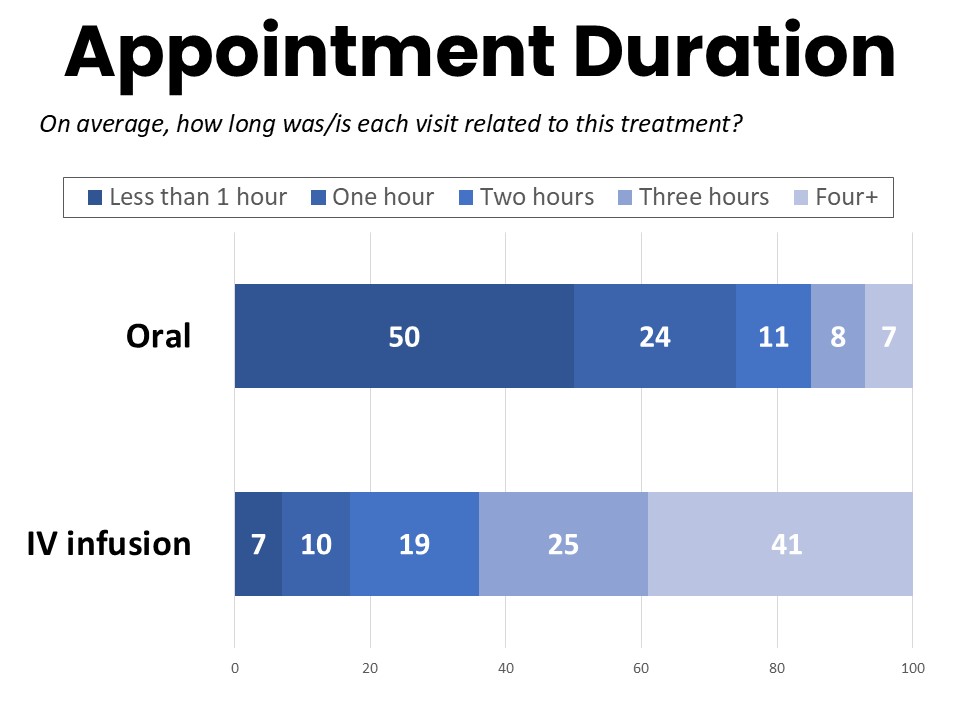
Cancer Patients Prefer Oral Treatment Methods and Procedures
Both the delivery method and the associated procedures are rated easier with oral medications than with IV infusions. A majority (61%) of patients taking an oral anti-cancer drug rate their experience with the treatment procedures, such as blood tests and fasting) as easy, compared to 43% of those receiving IV infusions. IV infusion patients are about twice as likely to rate these procedures as difficult (17% vs. 9%). Similarly, 75% of oral medication patients consider the treatment method easy compared to 43% of infusion patients, while those receiving infusions are four times as likely to rate the method as difficult (20% vs. 5%).
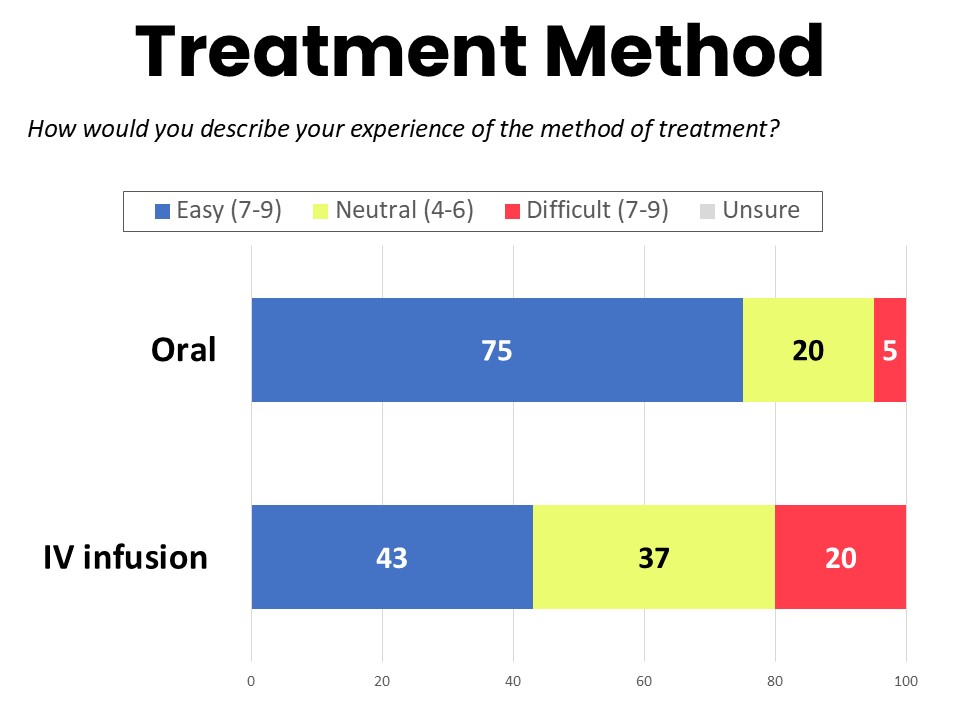
IV Infusions Have More Negative Impact on Quality of Life
Overall quality of life declines for many patients during cancer treatment, however the impact is significantly worse for patients receiving IV infusions than those taking oral medications. Sixty-two percent of infusion patients say the treatment made their quality of life worse, compared to 46% of those taking an oral medication.
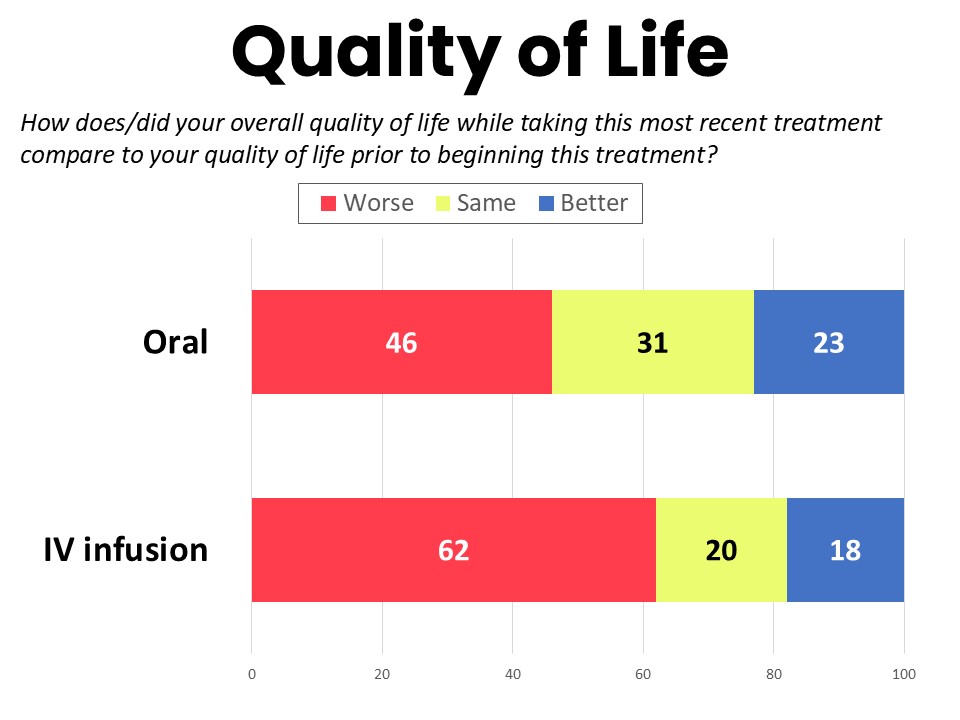
While oral therapies clearly have some advantages over IV infusions for many patients, it’s important that patients have access to the treatment modality that they and their doctor feel is most appropriate. When given a choice in treatment options, 82% say cost is an important factor in their decision. Nearly all (94%) agree that it is important for patients and their providers to have the ability to choose the type of treatment and delivery that best suits their needs.
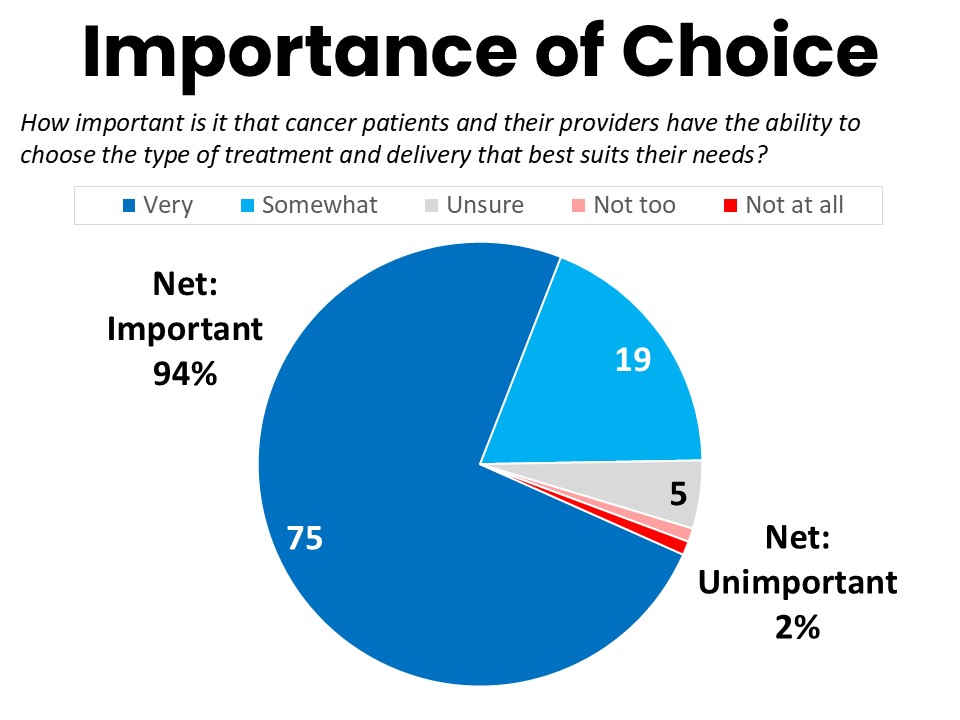
Methodology
ACS CAN’s Survivor Views research initiative was designed to support the organization’s efforts to end suffering and death from cancer through public policy advocacy. Data provided by cancer patients and survivors as part of this project allows for a greater understanding of their experiences and opinions on cancer-related issues and gives voice to cancer patients and survivors in the shaping and advocating of public policies that help prevent, detect, and treat cancer and promote a more positive quality of life for those impacted.
To ensure the protection of all participants in this initiative all research protocols, questionnaires, and communications are reviewed by the Morehouse School of Medicine Institutional Review Board.
The survey population is comprised of individuals who meet the following criteria:
- Diagnosed with and/or treated for cancer within the last seven years
- Over the age of 18 (parents of childhood cancer survivors were invited to participate on behalf of their minor children)
- Reside in the US or US territories
Survivor Views participants are invited to participate through email, direct mail, social media, and outreach to communities and partners engaged with cancer patients and survivors. Those who agree to participate after reviewing the informed consent information are invited to join the Survivor View’s research cohort and participate in future surveys. This survey also includes cancer patients and survivors nationwide from probability and non-probability panels. The data for this survey were collected between January 9-February 3, 2025. A total of 1,073 participants responded to the survey.
About ACS CAN
The American Cancer Society Cancer Action Network (ACS CAN) advocates for evidence-based public policies to reduce the cancer burden for everyone. We engage our volunteers across the country to make their voices heard by policymakers at every level of government. We believe everyone should have a fair and just opportunity to prevent, detect, treat, and survive cancer. Since 2001, as the American Cancer Society’s nonprofit, nonpartisan advocacy affiliate, ACS CAN has successfully advocated for billions of dollars in cancer research funding, expanded access to quality affordable health care, and advanced proven tobacco control measures. We stand with our volunteers, working to make cancer a top priority for policymakers in cities, states and our nation’s capital. Join the fight by visiting www.fightcancer.org.